As skin care becomes more and more important, so does the antioxidant Vitamin C serum for face. This serum is known for its ability to improve skin texture, and collagen production, as well as reduce wrinkles and aging spots. In this blog post, we will tell you all about Vitamin C face serum and its many benefits for the skin and face. We will also give you a simple guide on how to use vitamin C serum for best results.
What is Vitamin C serum?

Vitamin C serum is a topical skin treatment that has been shown to help improve the look of scars, sun spots, and age spots. It's a great way to keep your skin looking young and healthy without having to resort to expensive skin-care products. Make sure you're using a high-quality serum because not all brands are created equal in terms of efficacy. Apply it every morning and evening after your skincare routine.
Benefits of Vitamin C serum
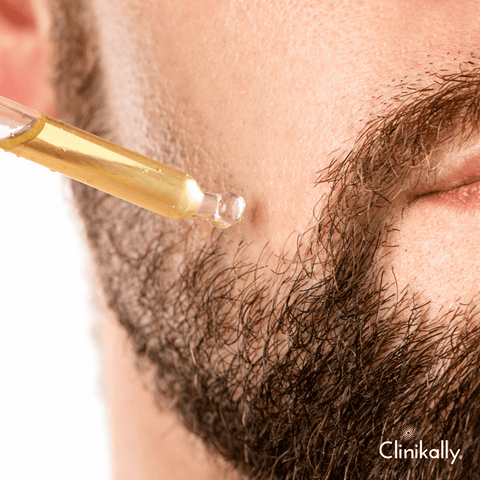
Are you looking for a serum that can help improve your skin tone and elasticity? Then using the right Vitamin c serum for face can help solve your problem. Not only does vitamin C serum help reduce wrinkles and crow’s feet, but it can also help boost collagen production for firmer skin
Vitamin C face serum is a great way to amp up your skin’s defence against external factors. Additionally, vitamin C serum can help reduce the appearance of skin aging signs like wrinkles and sagging skin. Use vitamin C serum twice daily after cleansing your face with soap and water to achieve maximum results!
#1 Helps in brightening skin tone
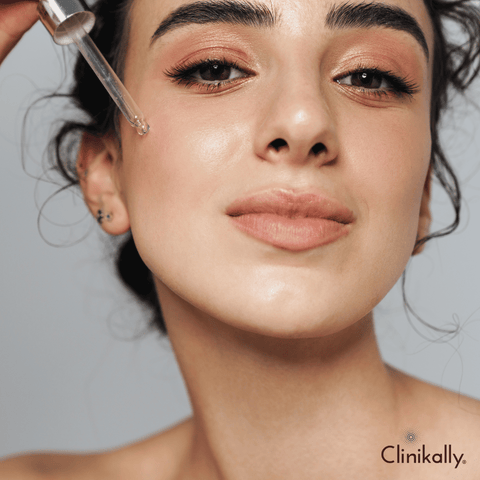
There is a reason why Vitamin C serum has been used as an essential skincare product for years. Studies have shown that people with darker skin tones tend to have lower levels of Vitamin C in their skin. This means that they are at a disadvantage when it comes to brightening their skin tone, as conventional skincare products containing Vitamin C often don't work well on dark-skinned individuals.
Fortunately, there are many natural ingredients found in Vitamin C serums that work better than prescription products. So if you're looking for an effective way to brighten your complexion, serum form is the best option available! To use it properly, apply it every day, morning, and night, or as directed by your dermatologist - though always talk to them before starting any new skincare routine!
#2 Helps even out skin tone

Acne scars, dark spots, skin dryness- any type of skin issue can be improved by using a serum. Vitamin C serum is especially beneficial as it helps to improve the appearance of skin tone as well as reduce the appearance of fine lines and wrinkles. It also hydrates skin so that it appears softer and smoother- making your complexion look even-toned in no time!
#3 Reduces hyperpigmentation
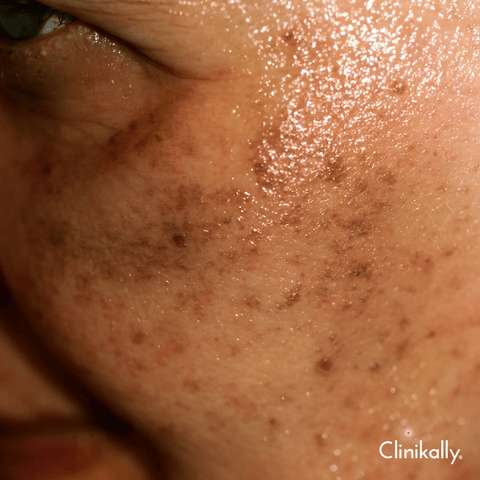
Hyperpigmentation is a skin condition that causes dark patches on the skin due to an overproduction of melanin. Vitamin C serum can help reduce hyperpigmentation as it works by increasing the production of melanin-fighting cells. However, be patient, as results may take up to two months for noticeable changes. In the meantime, follow the instructions carefully and use a serum every morning and evening before bedtime for the best results!
#4 Treats under-eye dark circles
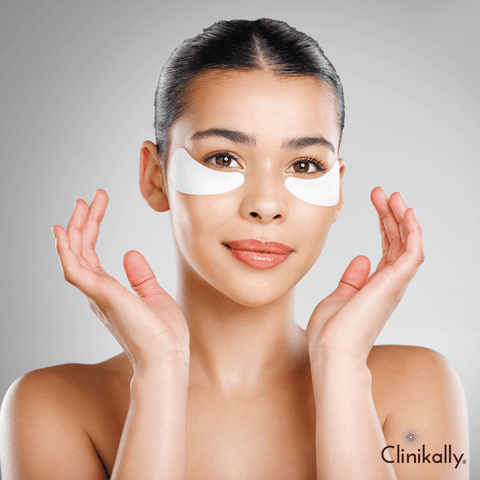
Under the eye, dark circles are a common problem that many people suffer from. Fortunately, there are a few vitamin C serum formulas out there that help to improve the appearance of the skin under the eyes and reduce blemishes as well as wrinkles and age spots. Before using any vitamin C serum, make sure to read your dermatologist's guide on how to use it for the best results. Then, apply the serum in the evening before bedtime for best results. Finally, be patient - Results may take up to 2-6 months, but they will be worth it!
#5 Hydrates skin and improves skin barrier function

Skin hydration is crucial for healthy skin. Serums that contain vitamin C are known to offer excellent hydrating properties as well as improve skin barrier function, reduce signs of ageing, and even brighten the complexion.
#6 Accelerates collagen production
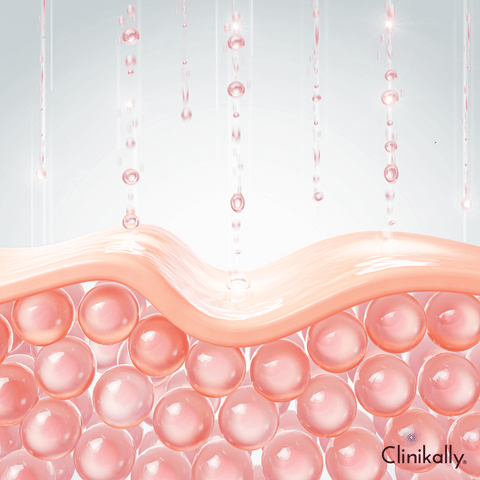
Collagen production is an important process that helps skin stay elastic and free from wrinkles. Vitamin C serum is a good way to help accelerate this process. There are different concentrations of vitamin C available on the market, so it is important to read the product label before using it. The higher concentration formulations are better for targeting acne-prone skin as they provide deeper penetration into pores. Apart from helping with collagen production, vitamin C serum can also improve skin texture and tone, as well as hydration levels. As part of your daily skincare routine, using a vitamin C serum will help you achieve these benefits in a fast and effective manner!
#7 Prevents skin sagging

Skin aging is a natural process that happens as we age. However, there are many things you can do to help prevent wrinkles, age spots, and other signs of skin aging. One of the best methods involves using vitamin C serum every day before applying your makeup- this will help keep your skin elastic and increase collagen production. Additionally, vitamin C serum helps reduce the appearance of wrinkles, age spots, and other blemishes- making it a great way to maintain healthy skin!
Using Vitamin C serum for face: Simple steps
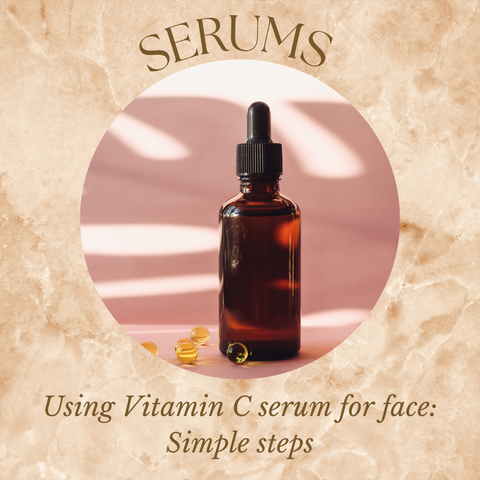
If you're looking to add some glow to your skin and help improve the appearance of skin problems, then the right Vitamin C serum could be the answer.
Dermatologist's guide to this skin-saving serum recommends following these simple steps: - Apply the serum twice a day, starting with the cleanest area of your face. Follow up with a moisturizer if needed - Be patient - results may take up to two weeks to show improvement. Vitamin C is a powerful antioxidant and can help improve the appearance of skin problems like acne.
Discover the best Vitamin C serum for you!

Vitamin C serum is a great way to take care of your skin and improve its appearance. Follow up each use of vitamin C serum with an appropriate moisturiser to keep skin hydrated and looking healthy. A serum should be applied every morning and evening, using light massage as you do so to work into the skin smoothly. Make sure to choose a serum that is formulated specifically for the face, as not all serum formulations are meant for all skin types. Vitamin C serum is also a great way to increase skin's defence against signs of aging. So why not give it a try and see the difference for yourself?
If you're looking for a serum that can help improve the skin's elasticity and moisture level, Vitamin C serum is a great option. We hope that this guide has helped you find the best serum for your skin type!
Vitamin C serum vs Vitamin C cream
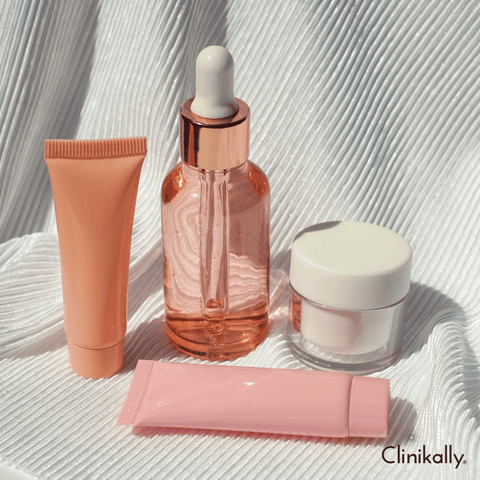
When it comes to Vitamin C skincare products, serums are often the popular choice due to their various benefits over Vitamin C cream. Vitamin C serum goes deeper into the skin and helps improve scars and sun spots while also fighting wrinkles. It is best to use vitamin C serum every night before bedtime for best results.
Side effects of Vitamin C face serum
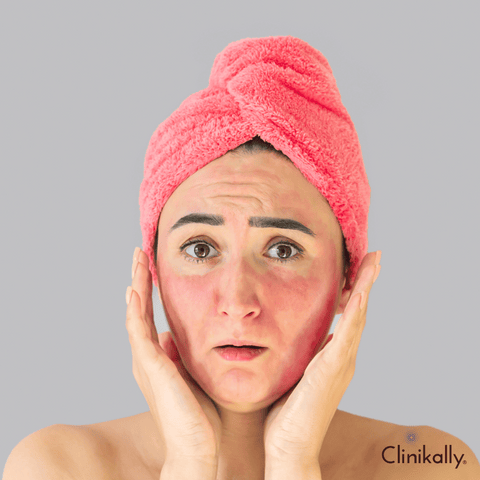
Vitamin C serum can be a great way to treat skin problems, but it is important to know the side effects so that you don't experience them. Side effects of using Vitamin C serum include redness, dryness, and peeling. Always speak with a dermatologist before starting any skincare routine, as they will be able to recommend the best product for your skin type and concerns. You can get an online dermatologist consultation on Clinikally based on your specific concerns and skin type and pick a time slot that works for you.
Vitamin C and Hyaluronic Acid
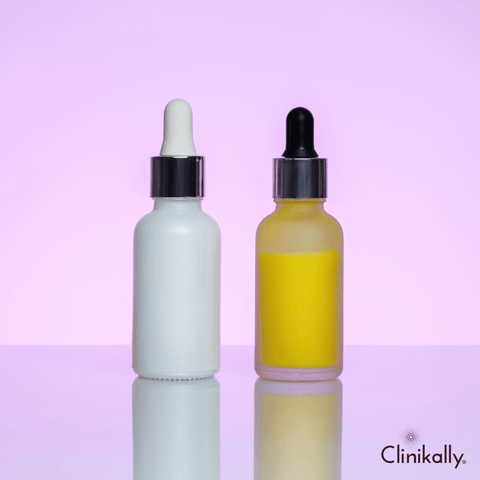
Vitamin C and Hyaluronic Acid complement each other to hydrate, protect, and repair skin aging defects. Vitamin C is well-known as an antioxidant that helps protect skin cells from damage, while hyaluronic acid provides a moisture-binding capacity to help skin stay hydrated and elastic.
Together, a Vitamin C serum and a Hyaluronic acid serum can visibly improve signs of aging such as wrinkles, fine lines, dryness, hyperpigmentation, photodamage, acne scars, and age spots.
The Role of Vitamin C in Anti-Aging Skincare

Vitamin C is essential in anti-aging skincare due to its high antioxidant capabilities and ability to support multiple skin functions. Here's an outline of the importance of Vitamin C in anti-aging skincare:
-
Powerful Antioxidant: Vitamin C acts as an antioxidant, neutralising free radicals produced by UV exposure and environmental stressors, reducing oxidative stress and skin cell damage.
-
Collagen Synthesis: Vitamin C is essential for collagen synthesis, promoting the production of collagen and elastin fibres that maintain skin elasticity, firmness, and youthful appearance.
-
Reduces Hyperpigmentation: Its ability to brighten the skin helps minimise the appearance of hyperpigmentation, dark spots, and uneven skin tone by preventing the production of melanin.
-
Anti-inflammatory Effects: Vitamin C has anti-inflammatory properties that can alleviate skin redness, irritation, and inflammation, resulting in a more balanced complexion.
-
Photoprotective Effects: While not a replacement for sunscreen, Vitamin C may boost the skin's natural defence against UV damage, providing an additional layer of protection.
-
Skin Barrier Support: It helps to reinforce the skin's natural barrier, aiding in moisture retention and preventing transepidermal water loss, promoting hydrated and healthier-looking skin.
-
Anti-Aging Benefits: By stimulating collagen production and supporting skin structure, Vitamin C can reduce the appearance of fine lines and wrinkles, resulting in a smoother complexion.
-
Skin Repair and Regeneration: Vitamin C aids in the regeneration of damaged skin cells and tissues, thereby accelerating the skin's healing process.
-
Enhances Other Skincare Ingredients: When used in conjunction with other skincare ingredients, such as Vitamin E and ferulic acid, vitamin C can enhance their efficacy by providing synergistic antioxidant effects.
-
Different Forms and Stability: Different forms of Vitamin C (ascorbic acid, derivatives such as sodium ascorbyl phosphate or magnesium ascorbyl phosphate) address different skin types and stability concerns.
-
Routine Inclusion: Incorporating Vitamin C into a skincare routine, such as serums, creams, or treatments, can result in long-term skin health and anti-aging effects.
-
Maintenance and Prevention: The multifaceted benefits of vitamin C aid not only in addressing signs of aging, but also in maintaining overall skin health and preventing future damage.
The science of Vitamin C and wrinkle reduction

The ability of Vitamin C to counteract oxidative stress, enhance collagen formation, and promote skin regeneration underpins its involvement in wrinkle reduction. Here's how Vitamin C helps reduce wrinkles:
-
Free Radicals: Vitamin C's potent antioxidant properties aid in the neutralisation of free radicals produced by UV exposure and environmental stressors, thereby preventing oxidative stress, which contributes to wrinkle formation.
-
Stimulates Collagen Synthesis: Vitamin C is required for collagen synthesis, a protein that is essential for skin structure, elasticity, and firmness. Increased collagen production aids in the reduction of wrinkle appearance.
-
Supports Elastin Production: Vitamin C aids in the production of elastin, another protein that allows the skin to snap back into place, contributing to smoother and more supple skin, which can reduce the depth of wrinkles.
-
Supplemental Sun Protection: While not a replacement for sunscreen, the antioxidant properties of Vitamin C can provide additional protection against UV damage, which can contribute to wrinkle formation.
-
Evens Skin Tone: The skin-brightening properties of vitamin C help fade dark spots, pigmentation, and discoloration, making wrinkles less visible on a more even-toned complexion.
-
Strengthens Skin Defence: Vitamin C helps maintain moisture and prevents dehydration by supporting the skin's natural barrier function, which can reduce the prominence of fine lines and wrinkles.
-
Reduces Inflammation: Vitamin C's anti-inflammatory properties may aid in the reduction of skin inflammation, reducing redness and irritation, which can exacerbate the appearance of wrinkles.
-
Supports Skin Repair: Vitamin C aids in the repair of damaged skin cells and tissues, hastening the healing process and potentially reducing the visibility of existing wrinkles.
-
Improves Texture: Regular use of Vitamin C can result in smoother skin texture, reducing the appearance of wrinkles and fine lines for a more refined complexion.
-
Enhanced Effects with Other Ingredients: When combined with other beneficial ingredients such as Vitamin E or ferulic acid, the efficacy of Vitamin C in reducing wrinkles may be enhanced due to synergistic effects.
-
Consistent Use: Incorporating Vitamin C into a daily skincare routine over time can result in cumulative anti-aging benefits, such as wrinkle reduction and improved skin quality.
-
Holistic Skincare: Vitamin C's multifaceted actions target existing wrinkles, help maintain skin health, and prevent further signs of ageing, providing a holistic approach to skincare.
Combining Vitamin C with sunscreen for enhanced protection

Combining Vitamin C with sunscreen can provide additional protection against sun damage and skin ageing by providing a complementary defence system. Here's how combining Vitamin C and sunscreen can help:
-
Antioxidant Synergy: Vitamin C and sunscreen with UV filters work together to combat free radicals produced by UV radiation, providing enhanced protection against oxidative stress.
-
UV and IR Protection: Antioxidant properties of vitamin C supplement UV protection provided by sunscreen, potentially providing additional defence against infrared (IR) radiation.
-
Support for Collagen: Vitamin C stimulates collagen synthesis, which, when combined with sunscreen, can help maintain skin elasticity while also reducing collagen breakdown caused by sun exposure.
-
Reduced Hyperpigmentation: The skin-brightening effects of vitamin C, combined with UV protection from sunscreen, can help fade dark spots and prevent hyperpigmentation from worsening due to sun exposure.
-
Enhanced Skin Barrier: The combination of Vitamin C and sunscreen can help strengthen the skin barrier, reduce moisture loss, and support skin hydration.
-
Anti-Inflammatory Benefits: When combined with sunscreen, vitamin C's anti-inflammatory properties may help to relieve skin irritation and redness caused by UV exposure.
-
Boosted Sunscreen Efficacy: Some research suggests that Vitamin C may improve the efficacy of sunscreens, potentially increasing overall protection against UV-induced damage.
-
Photoprotection Optimization: Vitamin C may serve as an extra line of defence, offering more photoprotection against UV radiation, when applied on top of sunscreen.
-
Long-term Skin Health: Using Vitamin C and sunscreen together regularly can result in cumulative anti-aging benefits, resulting in healthier, more resilient skin over time.
-
Combined Skincare Benefits: Combining Vitamin C and sunscreen is part of a comprehensive skincare routine that addresses multiple aspects of skin protection and anti-aging.
-
Consistent Application: Incorporating both Vitamin C and sunscreen into a daily skincare regimen ensures consistent protection against sun damage and promotes overall skin health.
-
Broad-Spectrum Defense: Utilising both Vitamin C and broad-spectrum sunscreen provides a well-rounded defence system against various wavelengths of harmful solar radiation.
By combining Vitamin C and sunscreen, you create a synergistic approach that maximises protection against UV-induced damage, reinforces skin health, and contributes to a more comprehensive defence system against premature ageing and sun-related skin concerns.
Formulation Insights: The Stability of Vitamin C in Serums

The tendency of vitamin C to deteriorate when exposed to specific factors makes its stability in serums an important factor to take into account. The following are important details about the variables influencing vitamin C stability in serum formulations:
-
pH Level: The ideal pH range for vitamin C, or ascorbic acid, is between 2.0 and 3.5. Formulations in this range maintain their stability and efficacy.
-
Oxidation: Vitamin C is prone to oxidation when exposed to air, light, or heat, resulting in a loss of potency. This can be mitigated by packaging in opaque, airtight containers.
-
Ingredient Interactions: Vitamin C can interact with certain ingredients in serums (such as acids, retinoids, or metals), affecting its stability and effectiveness.
-
Formulation Type: Various derivatives (ascorbic acid, sodium ascorbyl phosphate, magnesium ascorbyl phosphate) have varying levels of stability and penetration in serum.
-
Manufacturing Process: Ensuring proper formulation techniques, manufacturing processes, and storage conditions during production can help to preserve Vitamin C's stability in serums.
-
Light Exposure: Vitamin C is photosensitive, meaning that it degrades when exposed to light. Dark or opaque packaging protects the serum from light exposure.
-
Air Exposure: Limiting air exposure by using airtight containers or pumps prevents oxidation-induced Vitamin C degradation.
-
Storage Conditions: Store Vitamin C serums in a cool, dark place away from direct sunlight and high temperatures to maintain stability and extend shelf life.
-
Packaging Design: Choosing opaque or airless pump bottles for serums reduces Vitamin C's exposure to light and air, preserving its stability.
-
Time and Shelf Life: Vitamin C serums typically have a limited shelf life once opened. Regular application within the time frame recommended ensures potency and efficacy.
-
Quality of Ingredients: Using high-grade, stabilised Vitamin C and other complementary ingredients in serum formulations improves stability and effectiveness.
-
User Handling: Advise users to store serums properly (in a cool, dark place) and to close the container tightly after use to help maintain Vitamin C's stability.
To keep Vitamin C stable in serum formulations, formulation techniques, packaging, storage conditions, and ingredient interactions must all be carefully considered. These findings help manufacturers and users preserve the potency of Vitamin C, ensuring the serum's effectiveness in delivering the desired skincare benefits.
The best forms of Vitamin C for skin absorption

In skincare products, many types of Vitamin C are employed, each with varied degrees of stability and skin absorption. The following Vitamin C variants are known for their skin absorption properties:
-
L-Ascorbic Acid: The most common and purest form of Vitamin C is L-ascorbic acid. It has good skin penetration but is unstable, necessitating specific pH levels and proper storage to remain effective.
-
Sodium Ascorbyl Phosphate (SAP): SAP is a stable vitamin C derivative. It is less irritating to the skin and has a high level of stability, making it ideal for people with sensitive skin.
-
Magnesium Ascorbyl Phosphate (MAP): MAP is another stable form of Vitamin C. It has good skin penetration and is less likely to irritate, making it suited for a wide range of skin types.
-
Tetrahexyldecyl Ascorbate (THD Ascorbate): THD Ascorbate is a more lipid-soluble version of Vitamin C that improves penetration into the lipid layer of the skin. It is well-known for its skin tolerance and stability.
-
Ascorbyl Glucoside: Ascorbyl glucoside is a stable derivative that, once absorbed via the skin, gradually transforms into ascorbic acid. It is well-known for its ability to brighten the skin.
-
Ascorbyl Palmitate: Vitamin C in the form of ascorbyl palmitate is a fat-soluble form. While it has good stability, its skin absorption may be lower than in other forms.
-
Ascorbic Acid with Ferulic Acid and Vitamin E: Combining ascorbic acid with antioxidants such as ferulic acid and Vitamin E can improve stability and efficacy, resulting in improved absorption and skin benefits.
-
Nanoencapsulated Vitamin C: Encapsulating Vitamin C molecules in nanoparticles has the potential to improve their penetration and stability in the skin.
-
Liposomal Vitamin C: Vitamin C is encapsulated within lipid spheres in liposomal formulations, which aids in penetration and protects it from breakdown, potentially improving skin absorption.
-
Phosphorylated Vitamin C Derivatives: Phosphorylated Vitamin C derivatives, such as sodium ascorbate phosphate, are more stable and absorb better through the skin.
-
Stay-C® 50: Stay-C® 50 (Sodium Ascorbyl Phosphate) is well-known for its stability and ability to convert to ascorbic acid when applied to the skin, delivering therapeutic effects.
-
Time-Released Vitamin C: Some formulations have time-released mechanisms that give Vitamin C to the skin gradually, extending its usefulness over a longer period.
The efficiency of Vitamin C for skin absorption varies depending on the formulation, concentration, and individual skin features. Experimentation and consultation with a skincare professional can assist in determining the best form of Vitamin C to use for specific skin conditions and needs.
How to store Vitamin C serums to maintain efficacy
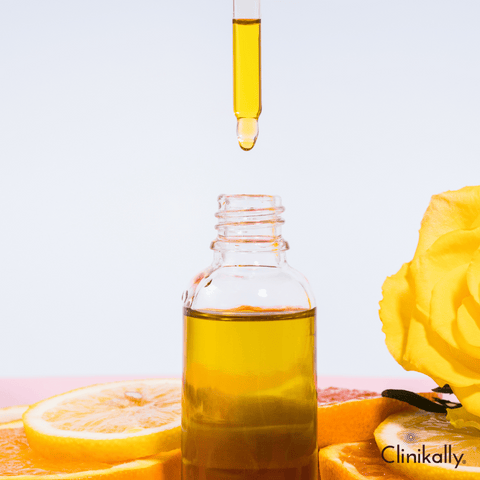
Vitamin C serums are sensitive to light, air, and temperature, so proper storage is essential to preserving their effectiveness. The following is an efficient way to store vitamin C serums:
-
Dark or Opaque Containers: Store Vitamin C serums in dark or opaque containers to prevent light exposure, which can cause degradation.
-
Airtight Containers: Choose airtight or vacuum pump containers to limit air exposure, as Vitamin C can oxidise when exposed to air, reducing its potency.
-
Cool, Dark Place: To maintain stability, keep Vitamin C serums away from direct sunlight and heat sources, such as windowsills or bathrooms.
-
Refrigeration: While not required for all formulations, refrigerating Vitamin C serums can extend their shelf life and preserve potency, particularly in less stable formulations.
-
Tight Lid Closure: After each use, make sure the lid or cap is tightly closed to prevent air from entering the container and causing oxidation.
-
Follow Usage Instructions: To ensure maximum effectiveness, follow the manufacturer's instructions regarding storage conditions and expiration dates.
-
Avoid Contamination: Prevent contamination by avoiding direct contact between the dropper and fingers or other surfaces. After each use, tightly close the lid.
-
Check for Changes: Keep an eye on the color, texture, and smell of the serum. Any color change (turning yellow or brown) or smell could indicate degradation.
-
Use within Recommended Period: Vitamin C serums have a short shelf life, particularly after opening. For maximum efficacy, use within the recommended time frame.
-
Consider Product Formulation: The stability of different Vitamin C formulations may differ. Some may necessitate more stringent storage conditions than others to maintain efficacy.
-
Travel Considerations: To maintain the serum's stability while travelling, keep it in a cool, dark place and avoid extreme temperatures.
-
Seek Professional Advice: If you are unsure about how to store the serum or notice changes in the serum, seek advice from a skincare professional or the product manufacturer.
The Synergistic Effects of Vitamin C with Other Skin Care Ingredients
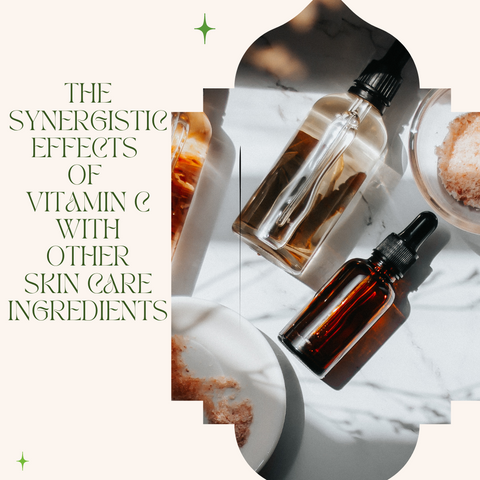
When combined with other skincare ingredients, vitamin C has synergistic effects that increase its efficacy and provide general skin health benefits. The following are some of the key synergies between Vitamin C and other skincare ingredients:
-
Vitamin E: The antioxidant qualities of vitamins C and E are enhanced by their mutual action, offering greater defence against oxidative stress and free radicals.
-
Ferulic Acid: Ferulic acid boosts stability and increases the photoprotective effects of Vitamin C against UV-induced damage. This is especially true when combined with Vitamin E and C.
-
Hyaluronic Acid: Vitamin C facilitates the production of collagen, and hyaluronic acid increases skin hydration, improving skin plumpness, firmness, and youthful appearance.
-
Niacinamide (Vitamin B3): Niacinamide works in tandem with Vitamin C to brighten the skin by reducing hyperpigmentation, evening out skin tone, and minimising the appearance of pores.
-
Retinoids (Vitamin A): The combination of Vitamin C and retinoids promotes collagen synthesis, which reduces the appearance of fine lines and wrinkles while improving skin texture and firmness.
-
Peptides: Peptides, when combined with Vitamin C, improve skin firmness and elasticity by promoting collagen production, thereby reducing visible signs of aging.
-
Alpha Hydroxy Acids (AHAs): AHAs and Vitamin C work together to promote gentle exfoliation, increase cell turnover, and improve skin texture and brightness.
-
Ceramides: Ceramides and vitamin C collaborate to strengthen the skin barrier, improve moisture retention, and protect against environmental stressors.
-
Green Tea Extract: Green tea extract with Vitamin C provides enhanced antioxidant protection, combating free radicals and supporting anti-inflammatory effects.
-
Resveratrol: Resveratrol, when combined with Vitamin C, strengthens antioxidant defences, reducing oxidative stress and supporting anti-aging effects.
-
Botanical extracts (for example, licorice extract): Botanical extracts combined with Vitamin C provide skin-calming benefits, reducing redness and brightening effects.
-
Sunscreen (UV Filters): Using Vitamin C in conjunction with sunscreen improves photoprotection by providing enhanced defence against UV-induced damage and reinforcing the skin's natural barrier.
Vitamin C and E: A Power Duo for Antioxidant Defense

Vitamin C and Vitamin E form a potent antioxidant combination, often referred to as a "power duo" in skincare. Their synergistic effects significantly enhance the skin's antioxidant defense system. Here's why they work so well together:
-
Enhanced Antioxidant Protection: Vitamin C and Vitamin E work synergistically, bolstering each other's antioxidant properties. They regenerate and stabilise one another after neutralising free radicals, extending the overall antioxidant protection.
-
Neutralising Free Radicals: Vitamin C and E intercept free radicals generated by UV exposure and environmental stressors, preventing oxidative damage to skin cells and reducing signs of aging.
-
Vitamin E Regeneration: Vitamin C aids in the regeneration of Vitamin E, which is a potent antioxidant in and of itself. When Vitamin E neutralises a free radical, it becomes unstable, and Vitamin C assists in regenerating it to its active state.
-
Photoprotection Synergy: When both vitamins are combined, they boost the skin's natural defence against UV-induced damage, lowering the risk of sunburn and premature aging.
-
Collagen Support: The antioxidant properties of this duo aid in the preservation of collagen, the promotion of firmer, more elastic skin, and the reduction of fine lines and wrinkles.
-
Skin Brightening: The combination of Vitamin C and E can help to fade dark spots, even out skin tone, and reduce hyperpigmentation for a more youthful appearance.
-
Anti-Inflammatory Properties: They have anti-inflammatory properties that can relieve skin redness, irritation, and inflammation caused by environmental aggressors.
-
Improved Stability: When vitamins C and E are combined, they stabilise each other in formulations, increasing shelf life and efficacy.
-
Skin Barrier Reinforcement: These antioxidants aid in the strengthening of the skin barrier, the retention of moisture, and the protection against environmental stressors.
-
Complementary Benefits: The combination of Vitamins C and E provides a holistic approach to skincare, addressing multiple concerns and supporting overall skin health.
-
Reduced Environmental Damage: Their combined action helps to mitigate the effects of environmental pollutants like smog and airborne toxins.
-
Sun Damage Mitigation: This pair helps to reduce the signs of premature aging caused by sun exposure by moderating UV-induced damage and oxidative stress.
Their interaction makes Vitamin C and E a particularly powerful combination in skincare products, delivering strong antioxidant defence against a variety of external aggressors while promoting healthier, more youthful-looking skin. Incorporating both vitamins into anti-aging and overall skin protection skincare routines can be highly beneficial.
Pairing Vitamin C with Peptides for Firming the Skin
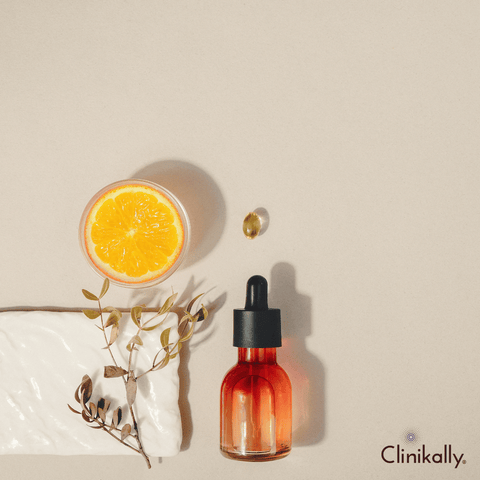
Combining Vitamin C and peptides in skincare formulas can provide synergistic advantages, especially in terms of firming the skin and addressing indications of aging. This is how the pairing works:
-
Support for Collagen: Vitamin C stimulates collagen synthesis, and peptides aid in signalling collagen production, both of which work together to improve skin firmness and elasticity.
-
Antioxidant Synergy: The antioxidant properties of vitamin C complement those of peptides, providing comprehensive protection against free radicals, which can contribute to skin aging.
-
Smoothness and refinement: Peptides can help to smooth the skin's texture, while Vitamin C helps to brighten the complexion and promote even skin tone.
-
Reduces aging signs: The combination of Vitamin C and peptides can help reduce the appearance of fine lines, wrinkles, and expression lines, resulting in a more youthful appearance.
-
Enhanced Regeneration: Vitamin C promotes skin repair and, when combined with peptides, boosts the skin's natural renewal process, promoting overall skin health.
-
Better Hydration: Vitamin C helps to keep skin hydrated, and peptides can support the skin's moisture barrier, which together encourages supple and plump skin.
-
Complementary Action: Peptides and vitamin C can enhance the synthesis of particular forms of collagen, strengthening the structural integrity of the skin.
-
Enhanced Skin Elasticity: Peptides and vitamin C work together to improve skin elasticity, which helps to keep the skin from sagging and gives the appearance of being lifted.
-
Enhanced Penetration: Peptides can help Vitamin C penetrate more deeply into the skin, increasing its effectiveness.
-
Wide-ranging Benefits: Vitamin C and peptides work together in skincare formulations to provide a comprehensive strategy for addressing various aging symptoms and promoting general skin health.
-
Barrier Reinforcement: Peptides and vitamin C can cooperate to improve the skin's barrier, reducing moisture loss and enhancing its defensive qualities.
-
Refined Skin Quality: When combined, these substances can help create a more even skin tone and a smoother, more refined skin texture.
When Vitamin C and peptides are combined, they form a powerful synergy that promotes collagen production, improves skin firmness, and addresses various signs of aging. Look for skincare products that contain both ingredients to reap the benefits of their combined effects on skin health and vitality.
Vitamin C for Different Skin Types: Tailoring Your Routine

When including Vitamin C in a skincare programme, different skin types must be considered to achieve optimal efficacy and compatibility. Here's how to customise a Vitamin C programme for different skin types:
-
Normal Skin: Most individuals with normal skin can tolerate vitamin C well. Incorporate it into your daily routine to keep your skin bright and even, and to protect against environmental damage.
-
Dry skin: Choose Vitamin C serums with hydrating ingredients or combine Vitamin C with hyaluronic acid to combat dryness while reaping antioxidant benefits for dry skin.
-
Oily/Acne-Prone Skin: Look for Vitamin C serums or gels that are lightweight and will not clog pores. Vitamin C can help fade acne scars and brighten skin without causing it to become oily.
-
Sensitive Skin: Start with lower concentrations of Vitamin C or choose derivatives such as sodium ascorbyl phosphate, which are gentler on sensitive skin. Patch test first and then gradually introduce.
-
Combination Skin: Apply Vitamin C to the entire face or to specific areas as needed. Consider layering lighter moisturisers in oilier areas and richer creams in drier areas.
-
Mature/Aging Skin: For fine lines, wrinkles, and age spots, choose higher concentrations of Vitamin C (within tolerance). Combine with peptides or hyaluronic acid for even more benefits.
-
Darker Skin Tones: Avoid high-strength Vitamin C concentrations that may cause irritation or hyperpigmentation. Choose low-irritating, stable formulas to avoid the chance of discoloration.
-
Rosacea-Prone Skin: In rare circumstances, vitamin C might worsen rosacea. Consult a dermatologist for guidance, or opt for Vitamin C compounds noted for their gentleness.
-
Dehydrated Skin: To prevent dehydration and support moisture retention, look for Vitamin C solutions that include moisturising components such as glycerin or aloe vera.
-
Sun-Damaged Skin: Consider increased Vitamin C doses for sun-damaged skin to aid in healing and protection against further UV-induced damage.
-
Eczema-Prone Skin: Eczema prone skin can be extremely sensitive. Seek the advice of a dermatologist when selecting non-irritating Vitamin C formulations.
-
Combination with Other Ingredients: Combine Vitamin C with components that compliment your skin type and treat specific concerns, such as hyaluronic acid for hydration or niacinamide for calming effects, to create a customised routine.
-
Patch Test and Observation: Before using new Vitamin C products daily, always patch test them and watch for any bad reactions.
Customising your Vitamin C routine according to your skin type ensures that you reap its benefits effectively while minimising the risk of irritation or adverse reactions. Consulting a dermatologist or skincare professional can provide personalised recommendations based on individual skin needs and concerns.
Addressing the Myth: Can Vitamin C Cause Skin Breakouts?

There is a common misconception that Vitamin C can cause skin breakouts. However, Vitamin C itself is not a direct cause of acne or breakouts. Vitamin C is generally well-tolerated by most skin types and is considered safe for topical application. However, certain people may experience breakouts or skin irritation after using Vitamin C products in rare cases. Here are some reasons why this might occur:
-
Ingredient Sensitivity: Some people may be sensitive or allergic to certain forms of Vitamin C or other ingredients in the formulation, resulting in skin irritation or breakouts.
-
High Concentrations: High concentrations of Vitamin C in some products may be too strong for sensitive or reactive skin, causing irritation or breakouts.
-
Incorrect Formulation: Certain formulations or combinations of Vitamin C with other ingredients may be incompatible with all skin types, resulting in adverse reactions.
-
Pore-Clogging Ingredients: Some Vitamin C products may contain comedogenic (pore-clogging) ingredients, which can cause acne or breakouts, especially in acne-prone skin.
-
Incorrect Usage: Excessive Vitamin C use or failure to follow instructions regarding frequency and application may result in skin irritation or breakouts.
-
Initial Skin Adjustment: When first starting to use Vitamin C, some people may experience a brief "purging" phase in which the skin purges impurities before adjusting and improving.
-
Contaminated Products: Using expired or improperly stored Vitamin C products may result in bacterial contamination, resulting in skin problems.
-
Skin Type Variations: Ingredients in skincare products have varying effects on different skin types, so what causes breakouts in one person might not have the same effect on another.
-
Hormonal Factors: Breakouts may result from hormonal imbalances or changes, and using vitamin C at the same time as such changes may lead people to mistakenly link the product to the breakout.
-
Allergic Reactions: In extremely rare cases, an individual may develop an allergic reaction to Vitamin C or a product ingredient, resulting in skin irritation or breakouts.
It is important to note that for most people, Vitamin C is unlikely to be the direct cause of breakouts. If someone has persistent skin problems or breakouts after using a Vitamin C product, it is best to stop using it and consult a dermatologist to determine the root cause and find suitable skincare alternatives.
Seasonal Use of Vitamin C: Adjusting Your Skincare with the Climate

Adapting your skincare routine, including Vitamin C consumption, to seasonal and climate changes can improve its effectiveness and accommodate to your skin's changing demands. Here's how to adjust your Vitamin C intake based on the season and climate:
-
Hydration Emphasis: In the colder, drier months, focus on hydrating Vitamin C formulations to combat dryness. Consider combining it with richer moisturisers to prevent moisture loss.
-
Lightweight Formulas: To avoid clogging pores, choose lighter, non-greasy Vitamin C serums or gels in hot, humid weather. In warmer weather, these formulas are also more pleasant for the skin.
-
Products Rich in Humectants: To prevent dehydration in arid climates, select vitamin C products containing humectants, such as hyaluronic acid, to draw in and hold onto moisture.
-
Daytime Use Emphasis: To enhance the skin's natural defence against UV radiation and to provide additional protection against sun damage, increase your intake of vitamin C during the summer or high UV index months.
-
Sensitive Skin Consideration: To reduce irritation, people with sensitive skin should use lower concentrations of vitamin C during extreme weather.
-
Rotation Method: If you experience skin sensitization in harsh weather, use vitamin C sparingly (every other day, for example) to preserve benefits and minimise irritation.
-
Hydration Layering: To optimise hydration and seal in the serum, apply Vitamin C on top of thicker creams or face oils during cold, dry weather.
-
Flexible Routine: Be ready to modify your entire skincare regimen—not just the amount of Vitamin C—to accommodate your skin's changing needs and seasonal variations.
-
Internal Support: Eat a diet high in antioxidants to complement your external skincare regimen, particularly in the seasons when your skin is more susceptible to environmental stressors.
-
Year-Round Sunscreen: To protect skin from UV rays, apply broad-spectrum sunscreen and vitamin C together every season.
-
Observation of Individual Skin: Note how your skin reacts to Vitamin C about the seasons. Use according to individual comfort and skin response.
-
Dermatologist's Advice: If you are unsure about how to modify your Vitamin C intake for seasonal variations, consult a dermatologist or other skincare specialist.
By tailoring your vitamin C routine to the changing seasons, you can maximise the benefits of this powerful antioxidant and make sure your skin stays balanced and healthy all year long. You can also address specific skin concerns and adapt to changing environmental conditions.









































